六年级下册Unit 3 Can you play the guitar?复习课件(共29张无素材)
文档属性
| 名称 | 六年级下册Unit 3 Can you play the guitar?复习课件(共29张无素材) |
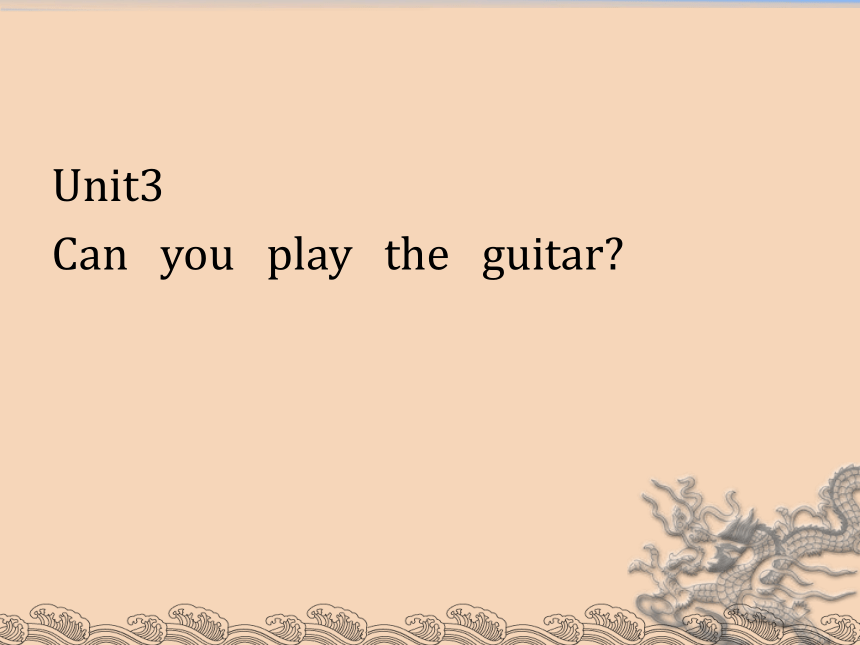
|
|
| 格式 | zip | ||
| 文件大小 | 779.6KB | ||
| 资源类型 | 教案 | ||
| 版本资源 | 鲁教版 | ||
| 科目 | 英语 | ||
| 更新时间 | 2020-04-25 21:56:43 | ||
图片预览

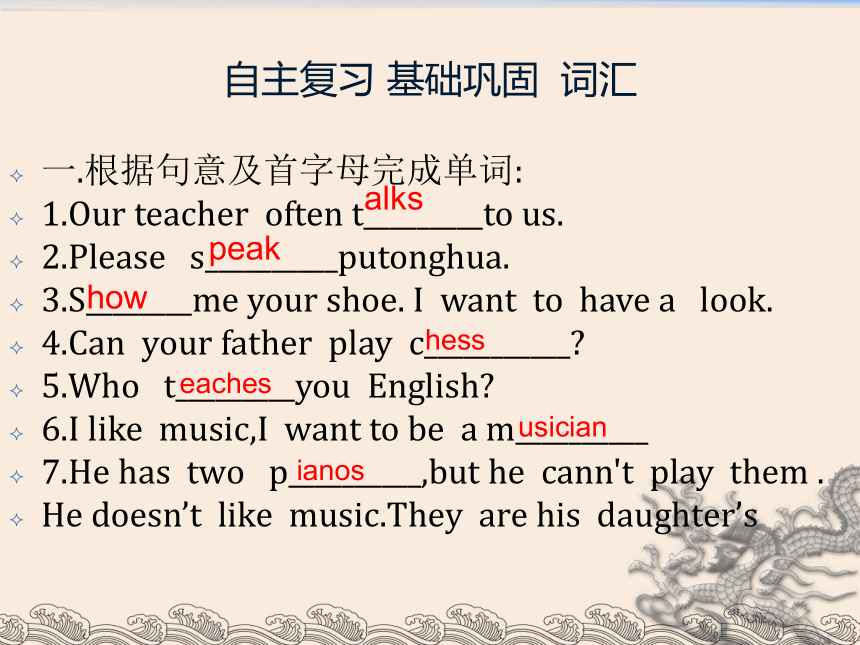
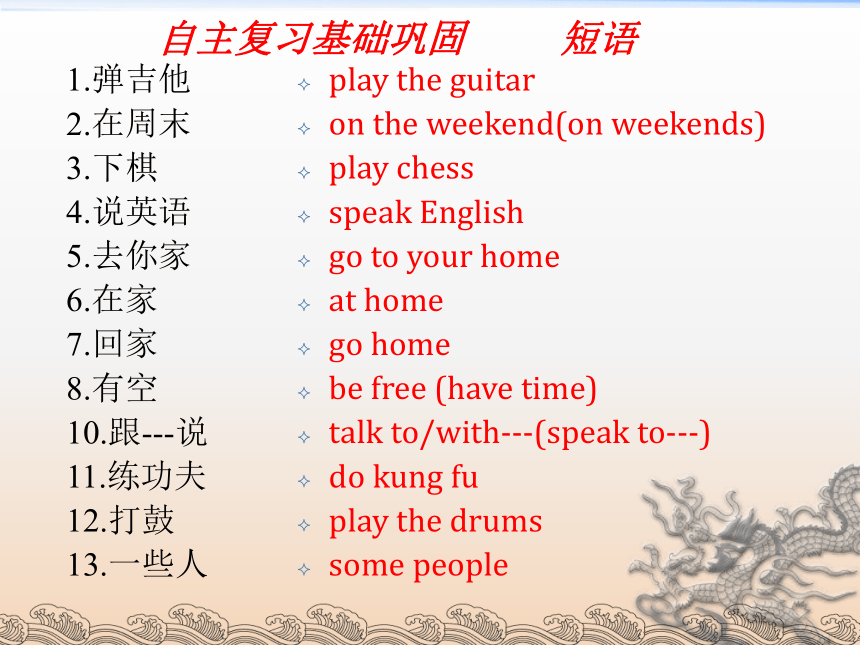
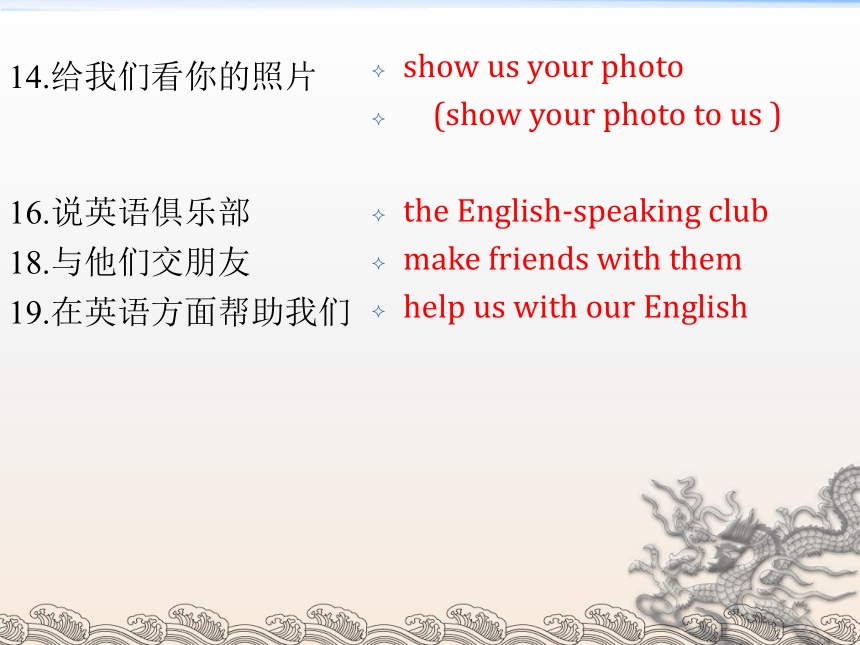
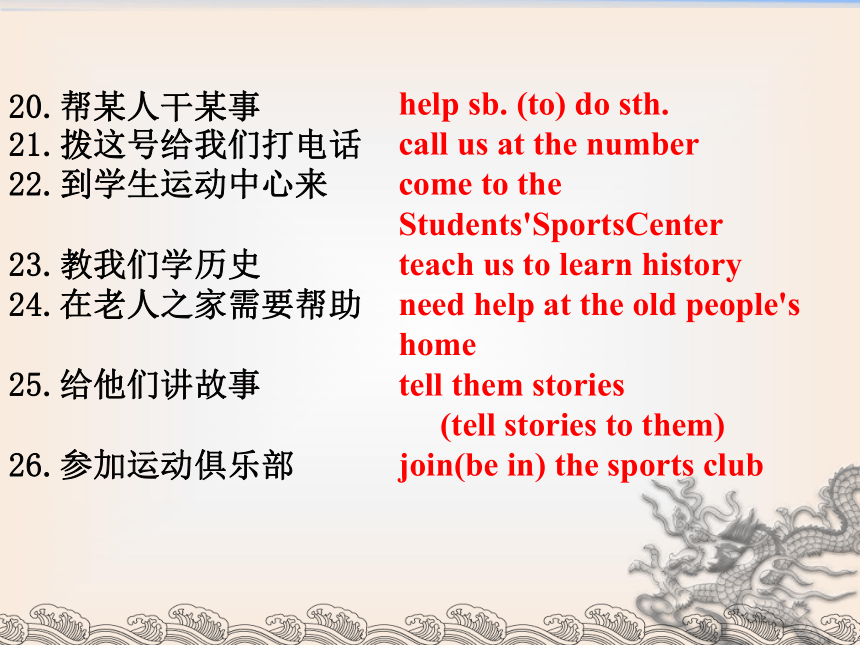
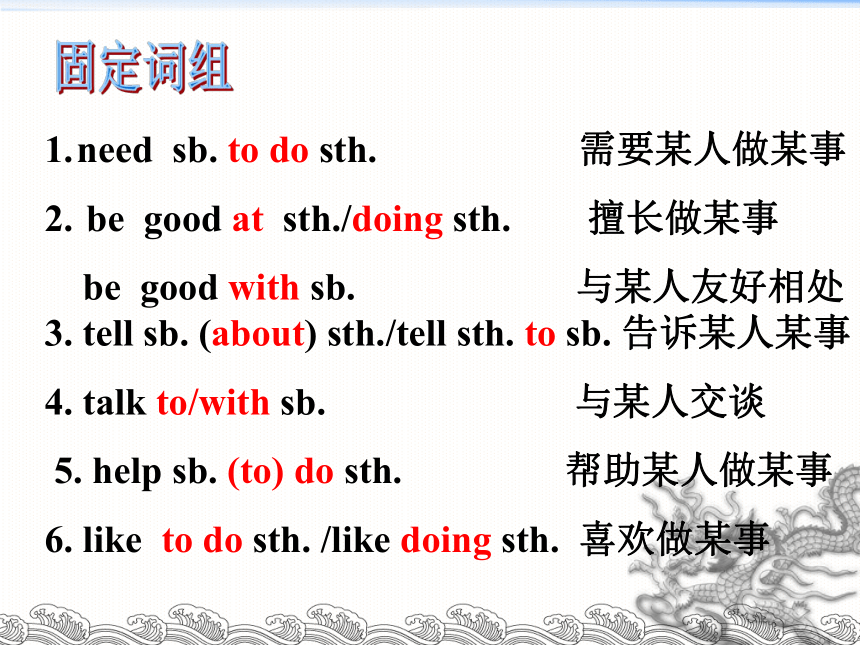
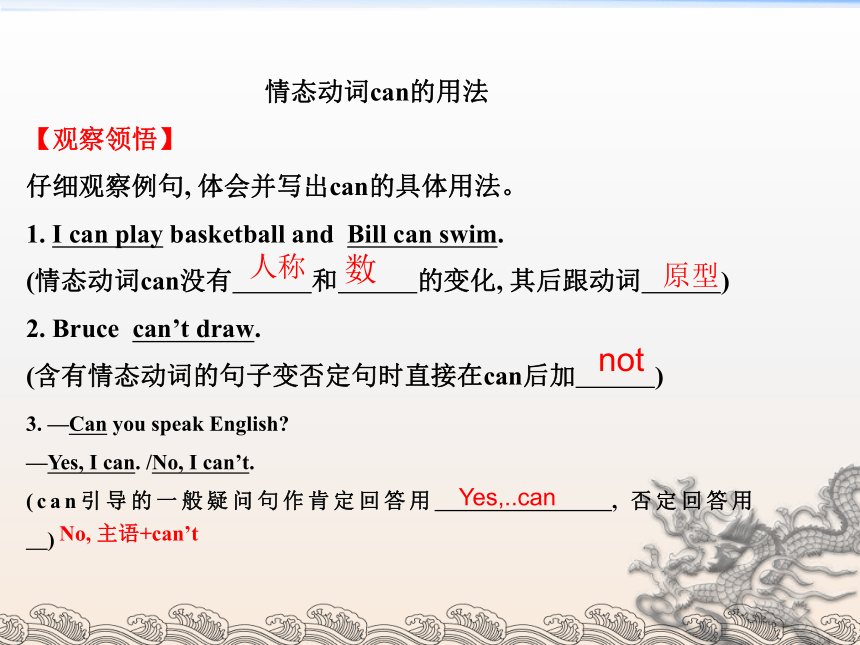
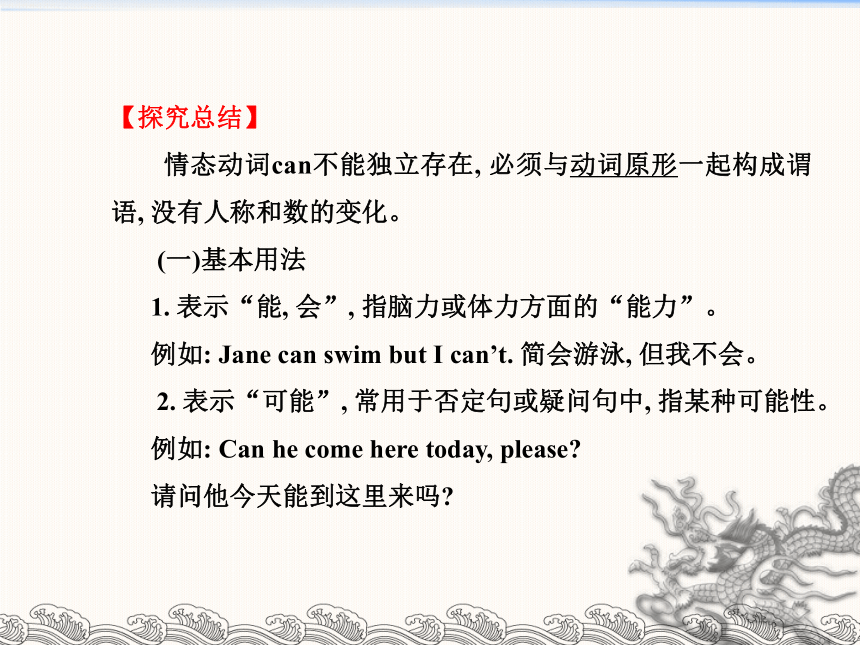
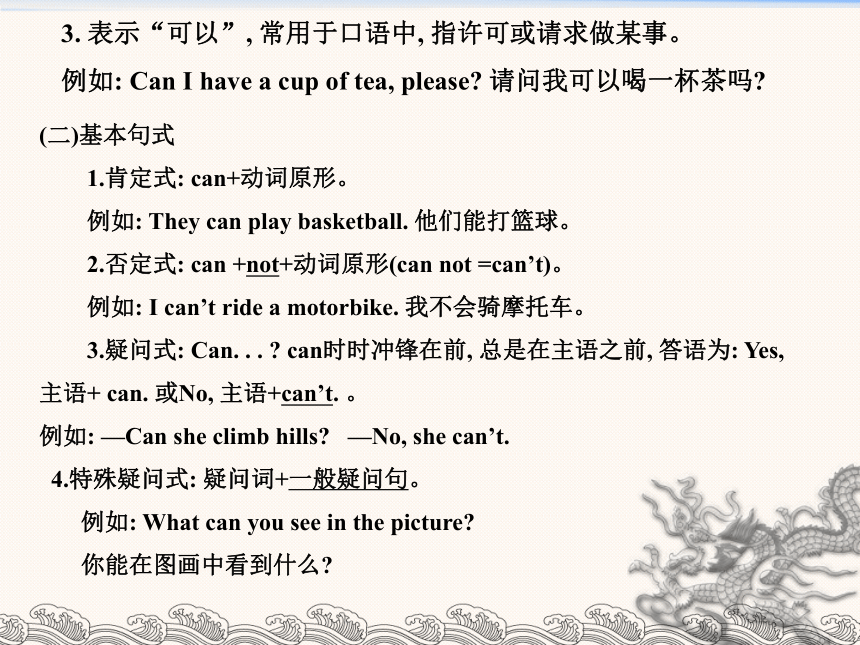
文档简介
(共29张PPT)
Unit3
Can you play the guitar?
自主复习 基础巩固 词汇
一.根据句意及首字母完成单词:
1.Our teacher often t_________to us.
2.Please s__________putonghua.
3.S________me your shoe. I want to have a look.
4.Can your father play c___________?
5.Who t_________you English?
6.I like music,I want to be a m__________
7.He has two p__________,but he cann't play them .
He doesn’t like music.They are his daughter’s
alks
peak
how
hess
eaches
usician
ianos
play the guitar
on the weekend(on weekends)
play chess
speak English
go to your home
at home
go home
be free (have time)
talk to/with---(speak to---)
do kung fu
play the drums
some people
自主复习基础巩固 短语
1.弹吉他
2.在周末
3.下棋
4.说英语
5.去你家
6.在家
7.回家
8.有空
10.跟---说
11.练功夫
12.打鼓
13.一些人
show us your photo
(show your photo to us )
the English-speaking club
make friends with them
help us with our English
14.给我们看你的照片
16.说英语俱乐部
18.与他们交朋友
19.在英语方面帮助我们
help sb. (to) do sth.
call us at the number
come to the Students'SportsCenter
teach us to learn history
need help at the old people's home
tell them stories
(tell stories to them)
join(be in) the sports club
20.帮某人干某事
21.拨这号给我们打电话
22.到学生运动中心来
23.教我们学历史
24.在老人之家需要帮助
25.给他们讲故事
26.参加运动俱乐部
need sb. to do sth. 需要某人做某事
be good at sth./doing sth. 擅长做某事
be good with sb. 与某人友好相处
3. tell sb. (about) sth./tell sth. to sb. 告诉某人某事
4. talk to/with sb. 与某人交谈
5. help sb. (to) do sth. 帮助某人做某事
6. like to do sth. /like doing sth. 喜欢做某事
固定词组
情态动词can的用法
【观察领悟】
仔细观察例句, 体会并写出can的具体用法。
1. I can play basketball and Bill can swim.
(情态动词can没有 和 的变化, 其后跟动词 )
2. Bruce can’t draw.
(含有情态动词的句子变否定句时直接在can后加 )
人称
数
原型
not
3. —Can you speak English?
—Yes, I can. /No, I can’t.
(can引导的一般疑问句作肯定回答用 , 否定回答用 )
Yes,..can
No, 主语+can’t
【探究总结】
情态动词can不能独立存在, 必须与动词原形一起构成谓语, 没有人称和数的变化。
(一)基本用法
1. 表示“能, 会”, 指脑力或体力方面的“能力”。
例如: Jane can swim but I can’t. 简会游泳, 但我不会。
2. 表示“可能”, 常用于否定句或疑问句中, 指某种可能性。
例如: Can he come here today, please?
请问他今天能到这里来吗?
3. 表示“可以”, 常用于口语中, 指许可或请求做某事。
例如: Can I have a cup of tea, please? 请问我可以喝一杯茶吗?
(二)基本句式
1.肯定式: can+动词原形。
例如: They can play basketball. 他们能打篮球。
2.否定式: can +not+动词原形(can not =can’t)。
例如: I can’t ride a motorbike. 我不会骑摩托车。
3.疑问式: Can. . . ? can时时冲锋在前, 总是在主语之前, 答语为: Yes, 主语+ can. 或No, 主语+can’t. 。
例如: —Can she climb hills? —No, she can’t.
4.特殊疑问式: 疑问词+一般疑问句。
例如: What can you see in the picture?
你能在图画中看到什么?
【实战演练】
Ⅰ. 单项选择
1. — you play the violin?
—Sorry, I can’t.
A. Do B. Are C. Can D. Is
2. Bob can and dance well.
A. sings B. to sing C. singing D. sing
3. — you help me with my Chinese?
—Yes, I .
A. Can; can’t B. Can; may
C. Can; can D. May; can
4. —Can you show me those pictures?
—Sorry, .
A. I can B. I can’t
C. here you are D. OK
5. I can play guitar and my brother can play
football.
A. a; a B. the; a C. a; the D. the; /
6—Little Tom can play chess.
— great!
A. Looks B. Sounds C. Listen D. That
7. Bill is good Chinese.
A. at B. in C. for D. with
一. Can you sing or dance? 你会唱歌还是跳舞?
【自主领悟】(1)本句是一个选择疑问句, 其基本结构为: 一般疑问句+or+选择项? 例如:
Do you like tea or milk?
你喜欢茶还是牛奶?
(2)or意为“或者”, 表示选择关系, 用于肯定句或疑问句中。例如:
I want to join a sports club or an art club.
我想加入一个体育俱乐部或者艺术俱乐部。
【活学活用】
①你喜欢写作还是画画?
Do you like to ?
②我的弟弟不喜欢牛奶和鸡蛋。
My brother doesn’t like milk eggs.
write or draw
or
【用法辨析】and与or作并列连词的区别
and 表示“和; 又”, 用于肯定句和疑问句中
or 表示“也不”, 用于否定句中
二、【用法辨析】“说”不同
【活学活用】
用say, speak, talk与tell填空。
①Let’s English in class.
②Bill often us good stories.
③Paul , “I like basketball. ”
④Lucy often to Mr. Wang after class.
speak
tells
says
talks
Ⅰ. 单项选择
1. They want singers their school show.
A. for B. in C. on D. of
2. Can I talk you after class?
A. for B. and C. or D. to
3. —Can you speak English Chinese?
—Chinese.
A. and B. or C. but D. to
4. My grandpa likes to us funny stories.
A. say B. tell C. talk D. speak
5. —What can you do?
— .
A. He can sing B. I like apples
C. I can’t sing D. I can play chess
Ⅱ. 句型转换
1. Tom can play chess. (改为一般疑问句)
Tom chess?
2. Rose wants to join the singing club. (对画线部分提问)
Rose want to join?
3. Can she swim? Can she do kung fu? (用or合并为一句)
Can she ?
Can play
What club does
swim or do kung fu
4. My sister, Jenny can play the violin and dance. (改为否定句)
My sister, Jenny play the violin dance.
5. Can I show her my new pen? (改为同义句)
Can I my new pen her?
can’t or
Show to
一. I can speak English and I can also play soccer.
我会说英语, 我也会踢足球。
【自主领悟】also“也”, 是副词。一般置于句中, 或位于行为动词之前, 或位于助动词或情态动词之后, 或位于动词be之后。例如:
I’m a student and my sister is also a student.
我是一名学生。我妹妹也是一名学生。
【用法辨析】also与too异同点
相同之处 also与too都用于肯定句
不同之处 also一般置于句中, 或位于行为动词之前, 或位于助动词或情态动词之后, 或位于动词be之后
too一般置于句尾
【活学活用】
用also或too填空。
①Bob can swim.
②Bill can play the piano, .
答案: ①also ②too
2. We need help at the old people’s home.
我们老人之家需要帮助。
【自主领悟】 home“家, 家乡; 本国”, 是名词, 指家庭成员一起生活的地方。常见的词组有:
at home 在家里
at home and abroad 在国内外
be home to 为……的所在地
二、【归纳拓展】be good相关的词组
be good at. . . 擅长 My sister is good at English.
我妹妹擅长英语。
be good for. . .
对……有好处 Eating more vegetables is good for your health.
多吃蔬菜对你的健康有好处。
be good with. . .
善于应付……的; 对……有办法 Anna is good with her friends.
安娜和她的朋友相处得好。
【活学活用】用适当的介词填空。
①Jeremy Lin is good basketball.
②Bill is good the children. They all like him.
③My mother often says milk is good us.
答案: ①at ②with ③for
Ⅰ. 单项选择
1. —I can speak Chinese. What about you?
—I can speak it.
A. too B. also C. well D. good
2. My father often helps me English.
A. to studying B. study
C. studied D. studying
3. Teachers wanted! Please call Mr. Thomas 435-7688.
A. at B. in C. for D. with
4. Grace is good soccer.
A. in B. at C. with D. for
5. She teaches .
A. I English B. my English
C. me English D. mine English
┃易错点针对训练┃
Ⅰ. 单项选择
( )1. —Can you ________ him to stop smoking?
—Sure.
A.tell B.say C.talk D.speak
( )2. The little boy ________ English very________.
A.speaks; good B.speaks; well
C.says; well D.tells; well
A
B
Ⅱ.用good或 well 填空
He is a ________ student; he is ________ and
studies________.
2. The food smells ________ and it sells ________.
Ⅲ.使用适当的介词填空
1. Running is good________ a man's health.
2. Parents aren't always good ________ their children.
good
well
well
good
well
for
with
4. If you are not good _________ driving, you'd
better keep the car away.
Ⅳ.使用所给词的适当形式填空
1. The book is very ____________ (interest).
2. I need a__________ (relax) holiday.
3. Are you __________ (interest) in music?
4. He doesn't feel __________ (relax) when he is at
work.
at
interesting
relaxing
interested
relaxed
Unit3
Can you play the guitar?
自主复习 基础巩固 词汇
一.根据句意及首字母完成单词:
1.Our teacher often t_________to us.
2.Please s__________putonghua.
3.S________me your shoe. I want to have a look.
4.Can your father play c___________?
5.Who t_________you English?
6.I like music,I want to be a m__________
7.He has two p__________,but he cann't play them .
He doesn’t like music.They are his daughter’s
alks
peak
how
hess
eaches
usician
ianos
play the guitar
on the weekend(on weekends)
play chess
speak English
go to your home
at home
go home
be free (have time)
talk to/with---(speak to---)
do kung fu
play the drums
some people
自主复习基础巩固 短语
1.弹吉他
2.在周末
3.下棋
4.说英语
5.去你家
6.在家
7.回家
8.有空
10.跟---说
11.练功夫
12.打鼓
13.一些人
show us your photo
(show your photo to us )
the English-speaking club
make friends with them
help us with our English
14.给我们看你的照片
16.说英语俱乐部
18.与他们交朋友
19.在英语方面帮助我们
help sb. (to) do sth.
call us at the number
come to the Students'SportsCenter
teach us to learn history
need help at the old people's home
tell them stories
(tell stories to them)
join(be in) the sports club
20.帮某人干某事
21.拨这号给我们打电话
22.到学生运动中心来
23.教我们学历史
24.在老人之家需要帮助
25.给他们讲故事
26.参加运动俱乐部
need sb. to do sth. 需要某人做某事
be good at sth./doing sth. 擅长做某事
be good with sb. 与某人友好相处
3. tell sb. (about) sth./tell sth. to sb. 告诉某人某事
4. talk to/with sb. 与某人交谈
5. help sb. (to) do sth. 帮助某人做某事
6. like to do sth. /like doing sth. 喜欢做某事
固定词组
情态动词can的用法
【观察领悟】
仔细观察例句, 体会并写出can的具体用法。
1. I can play basketball and Bill can swim.
(情态动词can没有 和 的变化, 其后跟动词 )
2. Bruce can’t draw.
(含有情态动词的句子变否定句时直接在can后加 )
人称
数
原型
not
3. —Can you speak English?
—Yes, I can. /No, I can’t.
(can引导的一般疑问句作肯定回答用 , 否定回答用 )
Yes,..can
No, 主语+can’t
【探究总结】
情态动词can不能独立存在, 必须与动词原形一起构成谓语, 没有人称和数的变化。
(一)基本用法
1. 表示“能, 会”, 指脑力或体力方面的“能力”。
例如: Jane can swim but I can’t. 简会游泳, 但我不会。
2. 表示“可能”, 常用于否定句或疑问句中, 指某种可能性。
例如: Can he come here today, please?
请问他今天能到这里来吗?
3. 表示“可以”, 常用于口语中, 指许可或请求做某事。
例如: Can I have a cup of tea, please? 请问我可以喝一杯茶吗?
(二)基本句式
1.肯定式: can+动词原形。
例如: They can play basketball. 他们能打篮球。
2.否定式: can +not+动词原形(can not =can’t)。
例如: I can’t ride a motorbike. 我不会骑摩托车。
3.疑问式: Can. . . ? can时时冲锋在前, 总是在主语之前, 答语为: Yes, 主语+ can. 或No, 主语+can’t. 。
例如: —Can she climb hills? —No, she can’t.
4.特殊疑问式: 疑问词+一般疑问句。
例如: What can you see in the picture?
你能在图画中看到什么?
【实战演练】
Ⅰ. 单项选择
1. — you play the violin?
—Sorry, I can’t.
A. Do B. Are C. Can D. Is
2. Bob can and dance well.
A. sings B. to sing C. singing D. sing
3. — you help me with my Chinese?
—Yes, I .
A. Can; can’t B. Can; may
C. Can; can D. May; can
4. —Can you show me those pictures?
—Sorry, .
A. I can B. I can’t
C. here you are D. OK
5. I can play guitar and my brother can play
football.
A. a; a B. the; a C. a; the D. the; /
6—Little Tom can play chess.
— great!
A. Looks B. Sounds C. Listen D. That
7. Bill is good Chinese.
A. at B. in C. for D. with
一. Can you sing or dance? 你会唱歌还是跳舞?
【自主领悟】(1)本句是一个选择疑问句, 其基本结构为: 一般疑问句+or+选择项? 例如:
Do you like tea or milk?
你喜欢茶还是牛奶?
(2)or意为“或者”, 表示选择关系, 用于肯定句或疑问句中。例如:
I want to join a sports club or an art club.
我想加入一个体育俱乐部或者艺术俱乐部。
【活学活用】
①你喜欢写作还是画画?
Do you like to ?
②我的弟弟不喜欢牛奶和鸡蛋。
My brother doesn’t like milk eggs.
write or draw
or
【用法辨析】and与or作并列连词的区别
and 表示“和; 又”, 用于肯定句和疑问句中
or 表示“也不”, 用于否定句中
二、【用法辨析】“说”不同
【活学活用】
用say, speak, talk与tell填空。
①Let’s English in class.
②Bill often us good stories.
③Paul , “I like basketball. ”
④Lucy often to Mr. Wang after class.
speak
tells
says
talks
Ⅰ. 单项选择
1. They want singers their school show.
A. for B. in C. on D. of
2. Can I talk you after class?
A. for B. and C. or D. to
3. —Can you speak English Chinese?
—Chinese.
A. and B. or C. but D. to
4. My grandpa likes to us funny stories.
A. say B. tell C. talk D. speak
5. —What can you do?
— .
A. He can sing B. I like apples
C. I can’t sing D. I can play chess
Ⅱ. 句型转换
1. Tom can play chess. (改为一般疑问句)
Tom chess?
2. Rose wants to join the singing club. (对画线部分提问)
Rose want to join?
3. Can she swim? Can she do kung fu? (用or合并为一句)
Can she ?
Can play
What club does
swim or do kung fu
4. My sister, Jenny can play the violin and dance. (改为否定句)
My sister, Jenny play the violin dance.
5. Can I show her my new pen? (改为同义句)
Can I my new pen her?
can’t or
Show to
一. I can speak English and I can also play soccer.
我会说英语, 我也会踢足球。
【自主领悟】also“也”, 是副词。一般置于句中, 或位于行为动词之前, 或位于助动词或情态动词之后, 或位于动词be之后。例如:
I’m a student and my sister is also a student.
我是一名学生。我妹妹也是一名学生。
【用法辨析】also与too异同点
相同之处 also与too都用于肯定句
不同之处 also一般置于句中, 或位于行为动词之前, 或位于助动词或情态动词之后, 或位于动词be之后
too一般置于句尾
【活学活用】
用also或too填空。
①Bob can swim.
②Bill can play the piano, .
答案: ①also ②too
2. We need help at the old people’s home.
我们老人之家需要帮助。
【自主领悟】 home“家, 家乡; 本国”, 是名词, 指家庭成员一起生活的地方。常见的词组有:
at home 在家里
at home and abroad 在国内外
be home to 为……的所在地
二、【归纳拓展】be good相关的词组
be good at. . . 擅长 My sister is good at English.
我妹妹擅长英语。
be good for. . .
对……有好处 Eating more vegetables is good for your health.
多吃蔬菜对你的健康有好处。
be good with. . .
善于应付……的; 对……有办法 Anna is good with her friends.
安娜和她的朋友相处得好。
【活学活用】用适当的介词填空。
①Jeremy Lin is good basketball.
②Bill is good the children. They all like him.
③My mother often says milk is good us.
答案: ①at ②with ③for
Ⅰ. 单项选择
1. —I can speak Chinese. What about you?
—I can speak it.
A. too B. also C. well D. good
2. My father often helps me English.
A. to studying B. study
C. studied D. studying
3. Teachers wanted! Please call Mr. Thomas 435-7688.
A. at B. in C. for D. with
4. Grace is good soccer.
A. in B. at C. with D. for
5. She teaches .
A. I English B. my English
C. me English D. mine English
┃易错点针对训练┃
Ⅰ. 单项选择
( )1. —Can you ________ him to stop smoking?
—Sure.
A.tell B.say C.talk D.speak
( )2. The little boy ________ English very________.
A.speaks; good B.speaks; well
C.says; well D.tells; well
A
B
Ⅱ.用good或 well 填空
He is a ________ student; he is ________ and
studies________.
2. The food smells ________ and it sells ________.
Ⅲ.使用适当的介词填空
1. Running is good________ a man's health.
2. Parents aren't always good ________ their children.
good
well
well
good
well
for
with
4. If you are not good _________ driving, you'd
better keep the car away.
Ⅳ.使用所给词的适当形式填空
1. The book is very ____________ (interest).
2. I need a__________ (relax) holiday.
3. Are you __________ (interest) in music?
4. He doesn't feel __________ (relax) when he is at
work.
at
interesting
relaxing
interested
relaxed
同课章节目录
- Unit 1 When is your birthday?
- Section A
- Section B
- Unit 2 My favourite subject is science
- Section A
- Section B
- Unit 3 Can you play the guitar?
- Section A
- Section B
- Unit 4 What time do you go to school?
- Section A
- Section B
- Unit 5 How do you get to school?
- Section A
- Section B
- Unit 6 Don't eat in class.
- Section A
- Section B
- Unit 7 Why do you like pandas?
- Section A
- Section B
- Unit 8 I'm watching TV.
- Section A
- Section B
- Unit 9 It's raining!
- Section A
- Section B
- Unit 10 Is there a post office near here?
- Section A
- Section B
